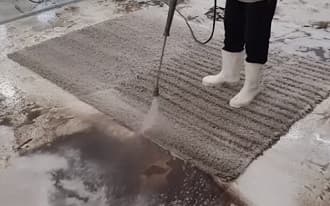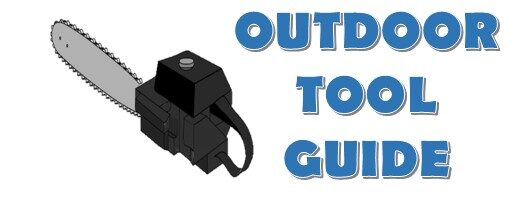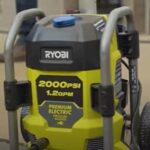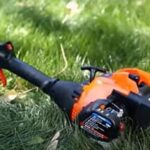As an Amazon Associate, this site earns commissions from qualifying purchases. For more information click here.
Of all the components of a pressure washer, the hose probably wears out the fastest. This is understandable since it is heavily used. At some point the hose will get damaged and require a replacement. But how do you choose which one to buy? Can you pick any pressure washer hose? This post answers all those questions.
The hose on pressure washers are not interchangeable. They come in various lengths and sizes so you have to pick one that is compatible. Otherwise the pressure washer might perform differently or not run at all.
Are Pressure Washer Hoses Universal?
No, they are not. Pressure washes hoses have similar functions, but their specifications vary. The type of hose you choose will depend on several factors. If you want the same results as before, choose a hose with the same exact specifications. Pick another type and the washer will handle differently.
If you use the wrong hose type, the pressure washer might not work. This is actually one of the reasons why water may not flow from a pressure washer.
Because hoses tend to look the same, it is easy to mistake one for the other, or that you can use any type. The difference in size among these hoses seem minimal. But the slightest change in size has an impact on your pressure washer.
To keep it simple. Pressure washer hoses are not universal. Some washers can work with different types of hoses, but the results will vary. If you want to improve performance, choose a different hose that is compatible with the pressure washer. If you want similar results, pick the same hose for the replacement.

What to Look for in a Pressure Washer Hose
There are many types of pressure washer hoses, but the most important factors are diameter, length, material and connector type. Which you choose depends on the pressure washer.
Before buying a hose, check the manual or the official manufacturer website for a list of compatible hoses. This will save you a lot of trouble as an incompatible hose can prevent the pressure washer from working.
Pressure Washer Hose Diameter Size
Check the diameter of the hose on your pressure washer. If it is not on the hose you can find it on the pressure washer manual. If you no longer have it, go to the manufacturer website and you should find its diameter. The most widely used hose diameters are the following.
1/4 inch. This is the most widely used pressure washer hose diameter size. Capable of handling up to 3000 PSI, this is the standard for home pressure washers. If a gas or electric pressure washer is aimed at consumers it is almost certainly using a 1/4 inch hose. One of the top choices is the Yamatic 50 ft pressure washer hose which is good for up to 3200 PSI. It also works with most popular brands.
3/8 inch. These hoses are for commercial level pressure washers. It can support up to 10000 PSI which is necessary for commercial grade cleaning. Because of this the hose is thicker than those for home use.
Residential pressure washers are usually not compatible with 3/8 inch hoses. And that is fine because homes do not need a 10000 PSI capable hose. These are the most powerful pressure washer hoses you can buy. For heavy duty this is the one to get.
5/16 inch. The capacity of these hoses is 2500-3500 PSI. It is rather uncommon compared to 1/4 and 3/8 hoses. If you do encounter 5/16 inch hoses, it is for gas pressure washers.
Pressure Washer Hose Length
Most consumer grade pressure washer hoses have a maximum length of 50 feet. Commercial grade washer hoses are double that at 100 feet.
The right length depends on the type of cleaning you do. The best approach is to check your pressure washer manual. If it says 50 feet, the hose it came with will be 50 feet. For most homes this is more than enough. You can always buy a hose extender connection if you need additional length. the PWaccs 3600 PSI Hose Extension is 50 feet long and offers universal compatibility with electric pressure washers.
Before you buy a pressure washer hose, think carefully of how you will use it. You have to estimate if the typical 50 ft. hose is sufficient or if you might need something longer. If you need a longer hose, look for a pressure washer that is compatible with these hoses.
Pressure Washer Hose Material
Hoses get tossed, twisted and pulled repeatedly, so its material composition is important. If your current hose is flexible and strong, pick a replacement made from the same material. If you want a stronger hose, check out other options.
There are many types to choose from, but the ones you will likely come across are the following.
Synthetic rubber. A growing number of pressure washers are compatible with rubber hoses. It is durable and works with up to 3500 PSI. Be careful when using the hose at maximum power as it can leave marks on concrete. Fortunately you can remove pressure washer marks on concrete. Read our guide for instructions.
PVC plastic. PVC plastic is the standard used for consumer grade pressure washers. These hoses are durable and well suited for residential cleaning tasks. The material is a little hard to bend compared to others, but it is generally easy to use. For most residential pressure washers this hose is enough.
Polyurethane. These hoses are covered in plastic so it is more flexible than PVC or rubber. The hoses also have metal braiding and capable of handling high water pressure. Another benefit is that these hoses are light.
Polyurethane hoses are designed for commercial grade application. The light weight and high capacity makes it suitable for continuous use without wearing out.
Pressure Washer Hose Connectors
There are two connectors on every pressure washer: one for the nozzle and one for the pump. How you link the hose depends on the design. With some pressure washers you use fasteners or screws, and with others a clamping mechanism.
Check the inlet on the spray gun, as that will tell you what type of connector to use. In most cases it will be either of the two.
Quick connect male and female. This is what usually comes with most consumer rated pressure washers. If that is the case with yours, you can get a male or female snap coupler if a replacement is needed. Your owner’s manual will tell you which is needed.
M22. If your pressure washer has M22 connectors, the rules are simple. Check if your spray gun has a female connector. If so, buy a male M22 connector. If the spray gun connector is male, get a female M22 connector.
Tips for Choosing a Pressure Washer Hose
The most important tip we can give is to read your owner’s manual. There you will find all the information necessary to find a compatible replacement hose.
If you are looking for an exact copy of the current hose you are using, that is easy. But if you want to upgrade the hose, here are some suggestions.
Stick with standard diameter sizes. Unless there is strong reason to change, 1/4 inch diameter hoses will be fine for consumer pressure washers. If you want to change up the result you can try different nozzles,
Plan for its use. As stated earlier, the most common length for home pressure washers is 50 feet. But shorter ones are available. It makes no sense to use a 50 ft. hose if you only need one that is half its length.
On the other hand if you need a longer hose, do not settle for a 50 ft. one. There are extensions available that will increase its length. Just make sure there is enough water pressure available if you change the setup.
Durability. If you have ever used a pressure washer before you know how much a typical hose goes through. This is why durability is crucial. If you use the pressure washer extensively, look for one that is designed for heavy duty use.

I love the outdoors and all the tools for maintaining gardens, yards and lawns. The only thing I am more passionate about is sharing what I know about garden and outdoor equipment.


